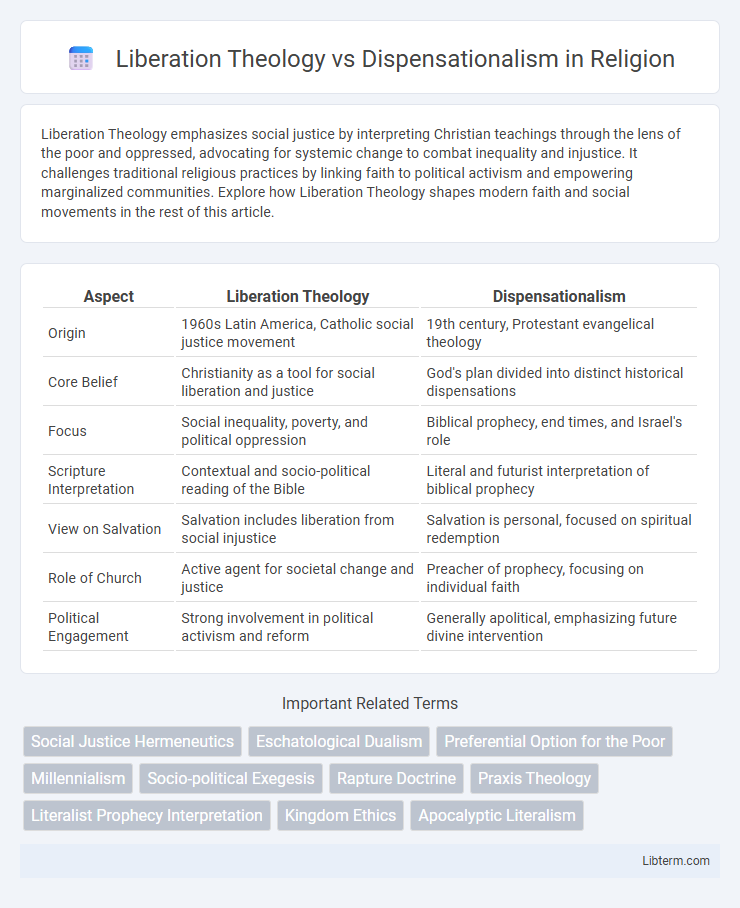Liberation Theology emphasizes social justice by interpreting Christian teachings through the lens of the poor and oppressed, advocating for systemic change to combat inequality and injustice. It challenges traditional religious practices by linking faith to political activism and empowering marginalized communities. Explore how Liberation Theology shapes modern faith and social movements in the rest of this article.
Table of Comparison
| Aspect | Liberation Theology | Dispensationalism |
|---|---|---|
| Origin | 1960s Latin America, Catholic social justice movement | 19th century, Protestant evangelical theology |
| Core Belief | Christianity as a tool for social liberation and justice | God's plan divided into distinct historical dispensations |
| Focus | Social inequality, poverty, and political oppression | Biblical prophecy, end times, and Israel's role |
| Scripture Interpretation | Contextual and socio-political reading of the Bible | Literal and futurist interpretation of biblical prophecy |
| View on Salvation | Salvation includes liberation from social injustice | Salvation is personal, focused on spiritual redemption |
| Role of Church | Active agent for societal change and justice | Preacher of prophecy, focusing on individual faith |
| Political Engagement | Strong involvement in political activism and reform | Generally apolitical, emphasizing future divine intervention |
Introduction to Liberation Theology and Dispensationalism
Liberation Theology emphasizes social justice and the preferential option for the poor, interpreting Christian teachings through the lens of political and economic liberation. Dispensationalism divides biblical history into distinct periods or dispensations, highlighting prophetic fulfillment and future eschatological events. Both theological frameworks influence Christian thought, yet Liberation Theology centers on present societal transformation while Dispensationalism focuses on divine timeline and prophecy.
Historical Origins and Development
Liberation Theology emerged in the 1960s-70s Latin America, rooted in Marxist social analysis and Catholic social teaching, emphasizing the church's role in social justice and the liberation of oppressed peoples. Dispensationalism originated in the 19th century through John Nelson Darby and the Plymouth Brethren, focusing on literal biblical interpretation and a futurist eschatology dividing history into distinct dispensations of God's governance. Both movements developed as responses to socio-political contexts--Liberation Theology addressing systemic poverty and injustice, while Dispensationalism arose amid theological debates on prophecy and end-times interpretation.
Core Beliefs and Doctrinal Foundations
Liberation Theology centers on the belief that Christianity demands social justice and the liberation of the oppressed, rooted in a Marxist analysis of societal structures and emphasizing praxis as a form of faith expression. Dispensationalism, grounded in a literal interpretation of the Bible, divides history into distinct periods or dispensations in which God interacts with humanity in different ways, emphasizing prophecy, the imminent second coming of Christ, and a clear distinction between Israel and the Church. While Liberation Theology prioritizes socio-political activism as essential to faith, Dispensationalism focuses on eschatology and strict doctrinal boundaries regarding salvation history.
Interpretation of Scripture
Liberation Theology interprets Scripture through the lens of social justice, emphasizing the Bible's call to address oppression and economic inequality, particularly in the context of marginalized communities. Dispensationalism approaches Scripture with a focus on distinct historical periods or dispensations, often highlighting prophetic fulfillment and a literal interpretation of eschatological passages. These differing hermeneutical frameworks shape contrasting theological priorities and applications within Christian doctrine.
Views on Social Justice and Political Activism
Liberation Theology emphasizes the preferential option for the poor, advocating for systemic social justice reforms and active political engagement to address economic inequality and oppression. Dispensationalism generally prioritizes spiritual salvation over social activism, interpreting biblical prophecy with a focus on end-times events rather than contemporary political involvement. The contrasting approaches shape their respective influences on faith communities' roles in social justice movements and political discourse.
Understanding of Salvation and the Kingdom of God
Liberation Theology interprets salvation as a holistic process involving social, political, and economic liberation from oppression, emphasizing the kingdom of God as a present reality manifested through justice and equity in society. Dispensationalism views salvation primarily as a personal spiritual redemption through faith in Jesus Christ, with the kingdom of God understood as a future, literal reign of Christ after a series of prophetic dispensations. These contrasting views reflect differing priorities: Liberation Theology centers on collective transformation here and now, while Dispensationalism stresses individual redemption and eschatological fulfillment.
Role of the Church in Society
Liberation Theology emphasizes the Church's active role in advocating social justice, empowering the poor, and challenging systemic oppression within society. Dispensationalism typically views the Church as a spiritual entity focused on individual salvation and eschatological readiness, with less emphasis on direct social or political engagement. Consequently, Liberation Theology integrates faith with social activism, whereas Dispensationalism prioritizes doctrinal purity and future prophetic fulfillment.
Eschatological Perspectives
Liberation Theology interprets eschatology through the lens of social justice, emphasizing the Kingdom of God as a present reality achieved by liberating the oppressed and transforming societal structures. Dispensationalism views eschatology with a futuristic orientation, stressing a literal interpretation of biblical prophecy, including the rapture, tribulation, and millennial reign of Christ as sequential events. The contrast lies in Liberation Theology's focus on active earthly liberation versus Dispensationalism's emphasis on imminent divine intervention and end-times fulfillment.
Contemporary Influence and Global Impact
Liberation Theology significantly shapes contemporary social justice movements, emphasizing the preferential option for the poor and advocating systemic change in Latin America and parts of Africa. Dispensationalism influences evangelical political engagement and eschatological perspectives, particularly in the United States and Israel, impacting foreign policy and Christian Zionism. Both frameworks contribute to global theological discourse by framing responses to poverty, politics, and prophecy within diverse cultural contexts.
Key Criticisms and Ongoing Debates
Liberation Theology faces criticism for its perceived politicization of Christian doctrine, emphasizing social justice and class struggle at the expense of traditional theological foundations. Dispensationalism is often challenged for its literalist interpretation of biblical prophecy and futurism, which some argue fosters escapism and neglects present social responsibilities. Ongoing debates center on the balance between faith and social action, with Liberation Theology advocating for transformative justice and Dispensationalism emphasizing eschatological hope.
Liberation Theology Infographic

 libterm.com
libterm.com